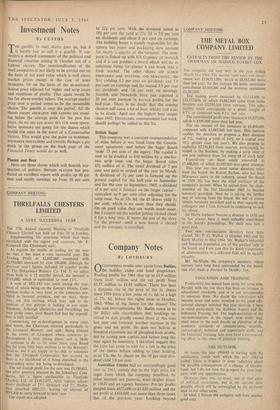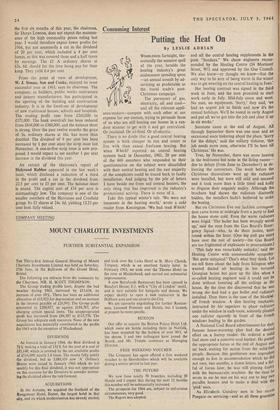Company Notes
By LOTHBURY
OUTSTANDING results once again from Butt ins, the holiday _camp and hotel proprietors. Trading profits for 1964 shot up to £4.9 million from £4.05 million and the net profit from £1.57 million to £1.81 million. -There has been a dynamic rise in the price of the Is. shares since 1959 from a low point of Is. 6d. to a high of 27s. 6d. before the rights issue in October, 1963. What of the future for the shares? The able and ever-optimistic Mr. Butlin (soon to be Sir Billy) tells shareholders that bookings re- ceived to date greatly exceed those at this time last year and forecasts another increase in the gross and net profit. He does not believe in financial expansion out of ploughed-back profits, but by raising new capital, and before long this . may again be necessary. I therefore suggest that the time has come to wait for a fall in the price of the shares before adding to your holding, as at 13s. the Is. shares on the 50 per cent divi- dend yield 3.8 per cent.
Australian Estates had an outstandingly good year in 1963, mainly due to the high price for sugar from which the company benefited. Its other interests are pastoral, wool (higher prices in 1963) and an agency business. Pre-tax profits jumped from £672,000 to /1.830 million and the net profit at £888,000 was more than three times that of the previous year. Looking beyond the first six months of this year, the chairman, Sir Denys Lowson, does not expect the mainten- ance of the high commodity prices ruling last year. I would therefore expect lower profits for 1964, but not necessarily a cut in the dividend of 20 per cent, which included a 4 per cent bonus, as this was covered three and a half times by earnings. The £1 A ordinary shares at 62s. 6d. should for the time being pay for their keep. They yield 6.4 per cent.
From the point of view of development, W. J. Simms, Son and Cooke, enjoyed its most successful year in 1963, says its chairman. The company, as builders, public works contractors and joinery manufacturers, has participated in the upswing of the building and construction industry. It is in the forefront of development of new traditional houses, schools and hospitals. The trading profit rose from £260,000 to £371,000. The bank overdraft has been reduced from £848,000 to £360,000, and the balance sheet is strong. Over the past twelve months the price of 5s. ordinary shares at 16s. has more than doubled. The dividend of 9 per cent has been increased by 1 per cent since the scrip issue last November. A one-in-five scrip issue is now pro- posed. I would expect to see another 1 per cent increase in the dividend this year.
An extract of the chairman's report of Holyrood Rubber appeared in our last week's issue, which disclosed a reduction of a third. in the profit and a cut in the dividend from 22.5 per cent to 15 per cent. The balance sheet• is sound. The capital cost of £34 per acre is outstandingly low. The company is one of the smaller members of the Harrisons and Crosfield group. Its £1 shares at 24s. 6d. yielding 12.25 per cent look fully valued.































 Previous page
Previous page